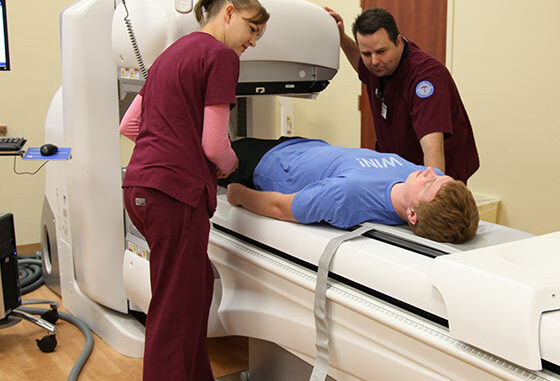
By Daniel Pineda
Staff Reporter
Amarillo College students are mastering a medical specialty that serves a dual purpose.
Tamra Rocsko, the AC nuclear medicine program director, said her students are learning to inject patients with radioactive materials to look and see what kind of diseases they have. Nuclear medicine students also learn how to treat certain cancers by performing the targeted radiation.
“So we diagnose and we treat. That’s kind of a double whammy,” Rocsko said.
Rockso explained that the program consists of five semesters, the first of which, always starts in the fall. In this semester, students start out by taking a patient care class and a physics class that is geared toward nuclear medicine. The second semester students take a radiopharmacy and instrumentation class. For the third and fourth semesters, students take a methodology class, with an addition of a PET-CT class in the fourth. For the final semester, students finish off with their capstone course.
“And all of that, they’re doing simultaneously while they’re doing clinical rotations at the clinical site,” Rocsko said.
The nuclear medicine program will allow students to practice hands-on. “The thing I like the most about my classes is the clinical aspect,” Mallery Warden, a nuclear medicine major, said. “Going to the clinical sites helps put what you learned in the classroom to a real life situation.”
This semester, second-year students are in the midst of taking their capstone course, which they have to pass in order to move on and take their registry exam.
“I’m hopeful that everybody passes their registry exam. It’s a big one because they will go take their board exams this semester. So, my biggest hope is that everybody does well, and passes their board,” Rocsko said.
Students describe the program as difficult, but rewarding.
“Being in a medical program is very challenging,” Inez Carrillo, a nuclear medicine major, said. “I’m just very thankful to have a supportive family that pushes me to finish my degree.”
Rocsko said that students who graduate with an associate degree in nuclear medicine immediately enter the workforce with a starting pay of $34 to $37 an hour.
“So their starting pay scale is really good. And after a two year experience, it goes up dramatically, but they start out with no experience at a pretty high pay scale.”
Rocsko also said that with a credential as a nuclear medicine technologist, graduates are able to work anywhere in the United States and even hold temporary jobs in Europe. Graduates can also work as radiation safety technicians at nuclear facilities, she said.

Leave a Reply